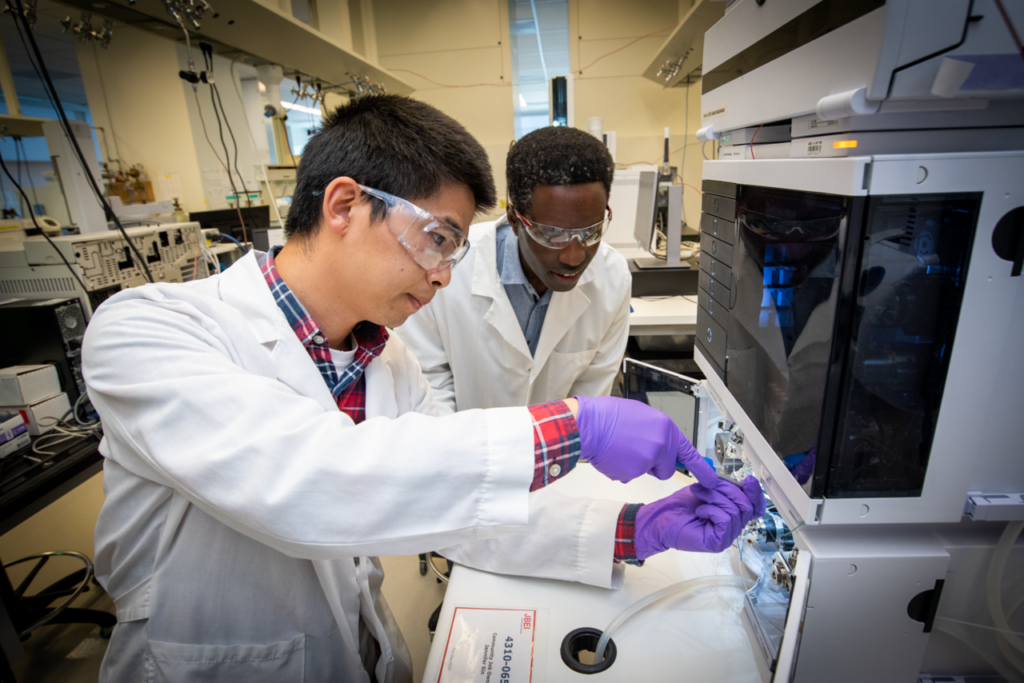February 27, 2024

The Agile BioFoundry (ABF) invites industry partners to enter collaborations (Strategic Core Industry Partnerships) focused on development of sustainable aviation fuels and drop-in and/or performance-advantaged biochemicals. From these partnerships, companies can leverage cutting-edge facilities, capabilities, and expertise at U.S. Department of Energy (DOE) National Laboratories. Industry Partners will have the first opportunity to license technologies produced in the course of collaboration under a Cooperative Research and Development Agreement (CRADA). As part of Strategic Core Industry Partnerships, industry partners will provide funding or in-kind support in addition to industry perspective and expertise.
The ABF is a consortium of seven DOE national laboratories that operate as a distributed biofoundry in collaboration with industry and academia. We have worked with more than 30 partners developing biomanufacturing tools and processes to enable sustainable industrial production of renewable fuels and chemicals.
Interested in working with us? Please contact ABF Business Development Lead Jesse Colangelo at [email protected].
Key deadline: New projects must have a statement of work and budget established by Dec. 31, 2024.
The following research areas are available for Strategic Core Industry Partnerships:
Sustainable Aviation Fuel: Ethanol
- Activity: Consolidated bioprocessing of lignocellulosic biomass and delignified residual biomass
- Goal: Increase ethanol yield, titer, and solids loading for consolidated bioprocessing
- Organism: Caldicellulosiruptor species and other anaerobic, thermophilic, cellulolytic microbes
- Detail: Screen strains on whole and delignified biomass samples, develop new genetic tools and synthetic biology tools in promising thermophilic microbes, conduct metabolic engineering in promising microbes for consolidated bioprocessing, systems biology, bioprocess development and scale-up of consolidated bioprocessing, techno-economic analysis, life cycle assessment.
Sustainable Aviation Fuel: Alkanes
- Activity: Develop economic microbial production of lipid feedstocks for American Society for Testing and Materials (ASTM) certified jet fuel
- Goal: Develop and optimize metabolic pathways and bioprocesses to produce lipid feedstocks for HEFA
- Organisms: Rhodosporidium toruloides
- Detail: Engineer R. toruloides to produce lipid-based products for hydrotreated esters and fatty acids (HEFA) at higher titers, rates and yields from renewable and scalable feedstocks, evaluate and develop technologies for co-processing scenarios, develop separation technologies, optimize bioprocess conditions, develop and implement new tools and capabilities that support product development, conduct techno-economic analysis and life cycle assessment of various scenarios.
Biochemicals: 3-hydroxypropionic acid
- Activity: Develop economic microbial production of 3-hydroxypropionic acid (3-HP)
- Goal: Optimize metabolic pathways and processes to produce 3-HP at industrially relevant titers, rates and yields from sugar feedstocks
- Organisms: Aspergillus niger
- Detail: Conduct techno-economic and life cycle analysis to identify needs for strain and bioprocess improvement. Identify genetic interventions to improve 3-HP titer, rate, and yield from sugar feedstocks via Design, Build, Test, Learn activities in A. niger. Develop bioprocess conditions to produce 3-HP at scale. Deploy new tools and capabilities that support development and commercialization of 3-HP technologies.
Biochemicals: Muconic acid
- Activity: Conversion of sugars to muconic acid
- Goal: Achieve industrially relevant strain and bioprocess performance for muconic acid production from hexose and pentose sugars derived from biomass
- Organisms: Pseudomonas putida KT2440
- Detail: Develop P. putida strains and bioprocesses for improved muconate production; test strain modifications for improved product titer, rate, and yield (TRY); conduct techno economic analysis (TEA) and life cycle analysis (LCA) modeling to identify needs for strain and bioprocess improvement; work with the Separations Consortium to develop optimal separations processes integrated with bioprocesses; develop, test, troubleshoot, and deploy new genetic tools and systems biology approaches in production strains; leverage synthetic biology to prevent bioreactor contamination.
ABF Capabilities
A note on Transparency of Foreign Connections.
Parties interested in collaborating with DOE National Labs are subject to review for Foreign Connections. This review will include assessment of the following:
1. Any current or pending subsidiary, foreign business entity, or offshore entity that is based in or funded by any foreign country of risk or foreign entity based in a country of risk;
2. Any current or pending contractual or financial obligation or other agreement specific to a business arrangement, or joint venture-like arrangement with an entity owned by a country of risk or foreign entity based in a country of risk;
3. Any current or pending change in ownership structure of the Recipient or subrecipients that increases foreign ownership related to a country of risk. Each notification shall be accompanied by a complete and up-to-date capitalization table showing all equity interests held including limited liability company (LLC) and partnership interests, as well as derivative securities. Include both the number of shares issued to each equity holder, as well as the percentage of that series and of all equity on fully diluted basis. For each equity holder, provide the place of incorporation and the principal place of business, as applicable. If the equity holder is a natural person, identify the citizenship(s);
4. Any current or pending venture capital or institutional investment by an entity that has a general partner or individual holding a leadership role in such entity who has a foreign affiliation with any foreign country of risk;
5. Any current or pending technology licensing or intellectual property sales to a foreign country of risk; and
6. Any changes to the Recipient or the subrecipients’ board of directors, including additions to the number of directors, the identity of new directors, as well as each new director’s citizenship, shareholder affiliation (if applicable); each notification shall include a complete up-to-date list of all directors (and board observers), including their full name, citizenship and shareholder affiliation, date of appointment, duration of term, as well as a description of observer rights as applicable.
Should DOE determine the connection poses a risk to economic or national security, DOE will require measures to mitigate or eliminate the risk. DOE has designated the following countries as foreign countries of risk: Iran, North Korea, Russia, and China. This list is subject to change.
Recognizing the disclosures may contain business confidential information, subrecipients may submit their disclosures directly to DOE.